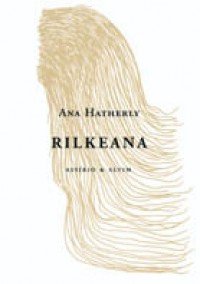Gesang ist Dasein: "Rilkeana" by Ana Hatherly

Published 1999.
In the past I’ve bought this book two times. Last week I bought it again, for the third and last time. I lent the other two, but for the life of me I cannot remember to whom they went. The one I’ve just bought won’t leave home…
Every time I read this book (I’ve read it several times) I always come back to Rilke (no surprise there…). But more than coming back to Rilke, I always wonder what Poesy does for me that Prose doesn’t. What does it represent, i.e., what kind of world does it depict, and what kind of operational forms does it use to transform our everyday experience into something esthetic pleasing, and so forth. I’ve looked for the answer everywhere (and I mean really everywhere: poets, in the poesy itself, interviews with poets, etc.) After this “quest”, I came back to Rilke, i.e., I decided to drop anchor. I’ve re-read Rilke several times, in several languages (in German most and foremost, but also in English, and in Portuguese). Reading Rilke, Trakl, Heine fell into disuse. Not to me. They’re not “fast food” poesy-wise. Their digestion is difficult and they don’t leave us at rest with the world. When I read them I’m not exactly looking for Daseinsfreude, the joy of the days to come. What I find in Rilke is a poet who traverses the ruins and debris to find the sublime greatness of the human soul. They are the poets of misery, sadness, impotence, terror, anguish, and darkness. We all have a few of those within ourselves…
 11
11
 1
1



